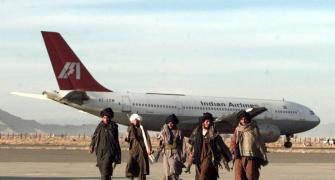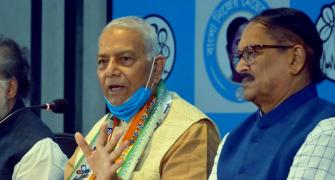It was December 31, 1999. As the hostages on IC-814 were leaving after their eight-day ordeal in Kandahar, a hijacker "quietly informed" now National Security Advisor and then lead negotiator Ajit Doval that a "New Year gift" had been left behind on the aircraft – a mysterious red bag.

AR Ghanashyam, the former Islamabad-based Indian diplomat who flew to Kandahar in Afghanistan and opened talks with the hijackers, recounts this and other details in a chapter in An Indian Woman in Islamabad, authored by his wife and former diplomat Ruchi Ghanashyam.
With the OTT show IC-814: The Kandahar Hijack rekindling interest in the December 24-December 31, 1999 hijacking that led to India releasing three terrorists in exchange for the lives of the hostages, Ghanashyam's retelling of his tense days in the Afghanistan town have found fresh resonance.
Ghanashyam, who was then commercial counsellor at the Indian high commission in Islamabad, received information that the aircraft was "planted with something that would blow up at midnight".
"One of the hijackers had quietly informed Doval that a New Year's gift had been left behind in the IC 814 aircraft for the government of India... I could not risk the lives of the relief pilots and crew. The aircraft had been kept confined for eight days. There was also the mystery of the 'red bag'. What was this 'red bag'? Who owned it?" he writes.
According to the book, the mystery of the red bag was cleared only two years later after then Taliban foreign minister Wakil Ahmad Muttavakil was arrested by the United States following the defeat of the Taliban in 2001.
"The 'red bag' belonged to one of the hijackers, it contained explosives, and possibly, real passports, too.
In their hurry they (the hijackers) had forgotten it in the hold. By the time they came back to recover it, the hostages had been released," he explains.
"The three prisoners brought down one by one from a separate aircraft were received by Taliban representatives. The hijackers joined the three prisoners, following which all of them disappeared. Then, the passengers, totally exhausted but very happy to be out of the stinking aircraft, disembarked," he writes.
Ghanashyam had been asked to stay back at Kandahar to arrange the refuelling and return of the hijacked aircraft.
A crew of 13 members, including one flight engineer and two pilots, Indian Airlines deputy managing director Capt J R D Rao and Capt Suri also remained in Kandahar.
Ghanashyam says he was advised to ensure that the crew and the two relief captains were not found anywhere near the aircraft and could not see the red bag and its contents himself. However, he claims it was Muttawakil who "acted illegally, betrayed our trust, and got the hold forcibly opened, and all the red bags taken out".
He recalls that the Taliban authorities were delaying the refuelling of the stranded plane and were keen to take out the one bag that belonged to the hijackers.
"Mr Muttawakil was still in the airport, and I rushed to him with Capt Suri and apprised him of the problem and requested him to advise the authorities to assist in facilitating an early departure of the aircraft.
"But the Taliban authorities were still trying to see the hold and look for a red suitcase of the hijackers. I brought this to the notice of foreign secretary and joint secretary Iran, Pakistan, Afghanistan (IPA) who had already reached New Delhi along with passengers and other members of the delegation," he adds.
Ghanashyam also talks in detail about a red Pajero used by Muttawakil in Kandahar parked right in front of the hold while others were searching the plane for the red bag.
"It could not be confirmed as to who was in the vehicle as it had tinted glasses... Capt Rao told me at that time he had seen people taking every red bag from the hold and showing it to the car and then taking it back to the hold.
"Two and two put together, we both felt that perhaps either one or more of the hijackers or someone close to them who could identify the infamous red suitcase were comfortably parked in the Red Pajero car and were trying out every red bag to identify the red bag and take it out," he adds.
Capt Suri, writes Ghanashyam, later learnt from a local worker that they "had found one bag and there were five grenades in it".
According to the book, eventually, the next morning on January 1, 2000, "fuel was supplied to the plane, the engine was checked, and took off at 0943 hrs, Afghan time". Ghanashyam boarded the UN plane the same day for Islamabad, Pakistan.
The Kathmandu-Delhi flight was hijacked on December 24, 1999, by five attackers and rerouted several times, eventually landing in Taliban-controlled territory.
The longest hijacking in Indian aviation history ended after a deal between the Indian government and the hijackers, with India releasing three terrorists -- Masood Azhar who in 2000 founded a new terror outfit Jaish e Mohammad (JeM) to wage war against India, Ahmed Omar Saeed Sheikh and Mushtaq Ahmed Zargar.
While Zargar was involved in the December 12, 1989 kidnapping of Rubaiya Sayeed, daughter of then home minister Mufti Mohammad Sayeed; Sheikh was accused of Kidnapping and murdering American journalist Daniel Pearl Pakistan in 2002. Published by Penguin Random House India, "An Indian Woman in Islamabad", priced at Rs 464, unveils the "intricacies of cross-border relationships and the relentless drumbeat of history as witnessed through the prism of political upheavals".









